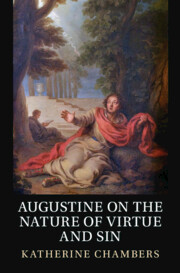Book contents
- Augustine on the Nature of Virtue and Sin
- Augustine on the Nature of Virtue and Sin
- Copyright page
- Contents
- Acknowledgements
- A Note on Translations and Abbreviations
- 1 Introducing the Issues
- 2 Political Virtues?
- 3 Political Vices?
- 4 Augustine’s Definitions of Virtue
- 5 Augustine’s Place within the Eudaimonist Tradition
- 6 The Life in Accordance with Nature
- 7 Self-Love and Neighbour-Love
- 8 The Nature of Sin
- 9 Weakness, Ignorance, and Pride
- Bibliography
- Index
1 - Introducing the Issues
Published online by Cambridge University Press: 10 January 2024
- Augustine on the Nature of Virtue and Sin
- Augustine on the Nature of Virtue and Sin
- Copyright page
- Contents
- Acknowledgements
- A Note on Translations and Abbreviations
- 1 Introducing the Issues
- 2 Political Virtues?
- 3 Political Vices?
- 4 Augustine’s Definitions of Virtue
- 5 Augustine’s Place within the Eudaimonist Tradition
- 6 The Life in Accordance with Nature
- 7 Self-Love and Neighbour-Love
- 8 The Nature of Sin
- 9 Weakness, Ignorance, and Pride
- Bibliography
- Index
Summary
This chapter notes that current scholarship on Augustine’s idea of pagan virtue and current scholarship on his political thought contain different, and conflicting, interpretations of his notions of virtue and vice, or sin. This chapter proposes that to determine which interpretation is correct we need to situate Augustine’s moral thought in relation to the ancient moral tradition of eudaimonism. Oliver O’Donovan and Nicholas Wolterstorff have proposed that Augustine broke with classical eudaimonism, but this chapter argues that their interpretation of the Stoic and Platonic tradition in eudaimonism is incorrect, and that a correct understanding of this tradition leads to the conclusion that Augustine in fact remained faithful to the eudaimonist approach to ethics.
Keywords
- Type
- Chapter
- Information
- Augustine on the Nature of Virtue and Sin , pp. 1 - 44Publisher: Cambridge University PressPrint publication year: 2023

